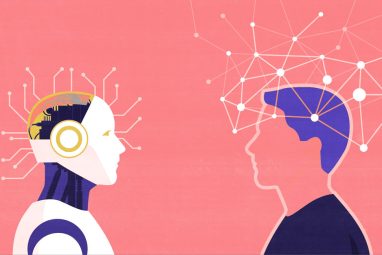AI’s Impact Could Spur New ‘Ministries for the Future,’ Say Policy Leaders
Experts agree that the true test of leadership will be political imagination.
News
- Dubai Chamber of Digital Economy Partners With Canva to Set Up Regional HQ
- Apple Puts Virtual Health Coach On Hold Amid Tough Competition
- Alphabet Remains Cautious On Apple Deal, Dodges Investor Question
- HBKU and QRDI Enter Partnership to Advance National Tech Capabilities
- UAE Families Expect AI to Redefine How They Live, Bond, and Raise Children
- Alphabet Pitches AI as Core Growth Engine in Post-Earnings Call

[Image source: Chetan Jha/MITSMR Middle East]
Artificial intelligence has come a long way from being just a concept on paper to propelling industries toward rapid growth and automation. Now, it is looking to get a seat at the global ministerial level.
Ian Bremmer, president of Eurasia Group, called AI the most disruptive geopolitical force of the decade, with far-reaching political consequences due to AI disparities and inequalities.
Suggesting that countries may soon have “ministries for the future” to anticipate and manage AI’s cross-sectoral impact, he said, “This isn’t something you solve with a single regulation…You need a whole-of-society approach — education, security, infrastructure, and ethics all at once.”
”This is not like climate change, where you have decades to respond,” he said.
Baroness Joanna Shields, former UK minister for Internet Safety and Security, and current Executive Chair of the Responsible AI Future Foundation, called out the political systems in place as “reactive by design” and ill-fitted to anticipate rapid disruption. “We legislate after the damage is done…AI doesn’t wait for elections or policy cycles. It learns, adapts, and scales in real time.”
Brad Smith, Vice-Chair and President of Microsoft, called out the AI disparity leading to a possible economic concern, “The world is dividing into those who have the compute power and data to build AI, and those who don’t. If we don’t act now, the AI divide could become as serious as the economic divide.”
AI depth can also be varied within countries: “You can’t have an AI economy if people don’t have electricity, connectivity, or education.”
“Bridging that infrastructure divide is just as important as building the next model.”
Arguing that such complexity demands entirely new governance structures, Eric Xing, president of Mohamed bin Zayed University of Artificial Intelligence said, “We need institutions that can think beyond election cycles; AI isn’t just a policy issue — it’s a civilisation issue.”
Experts agreed that the true test of leadership will be political imagination.
“We’ve had industrial revolutions before,” Shields concluded. “But never one where the machines start thinking for themselves. The question is whether our politics can learn to do the same.”








